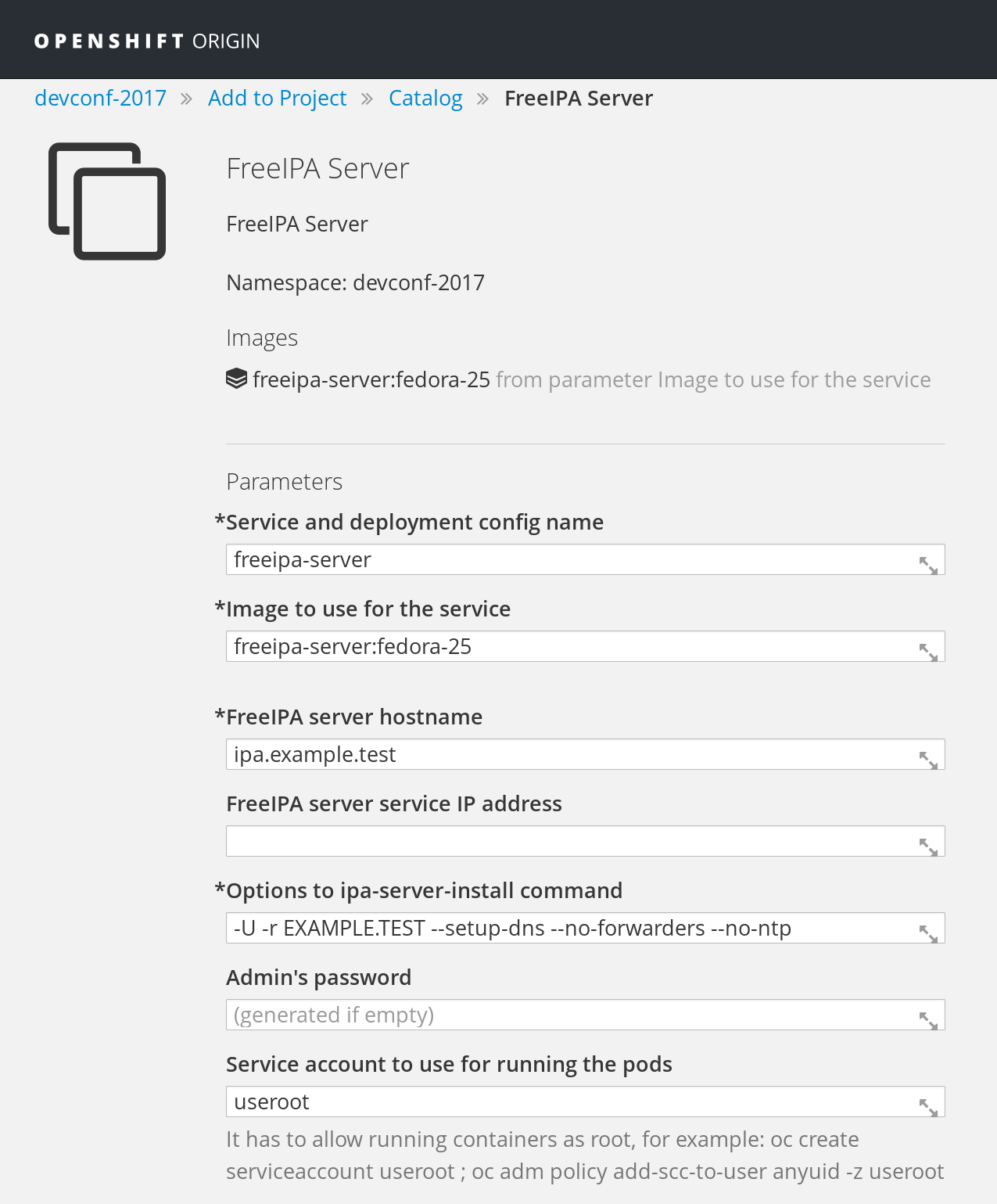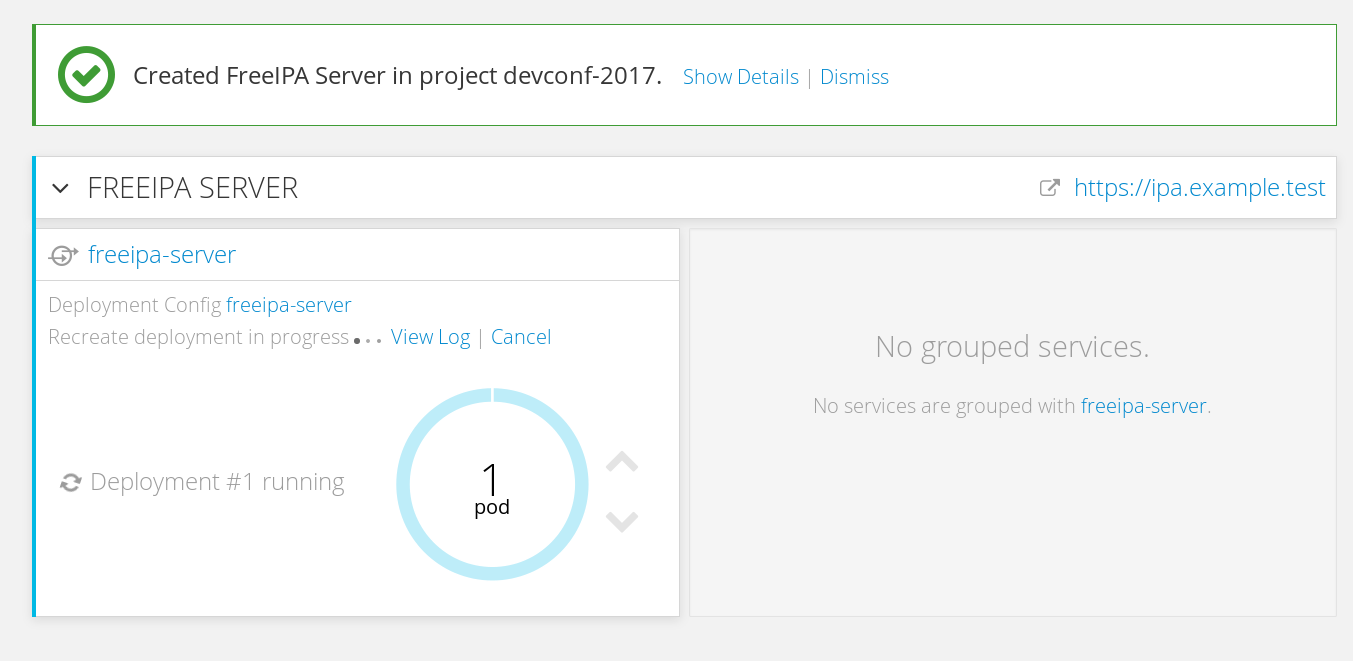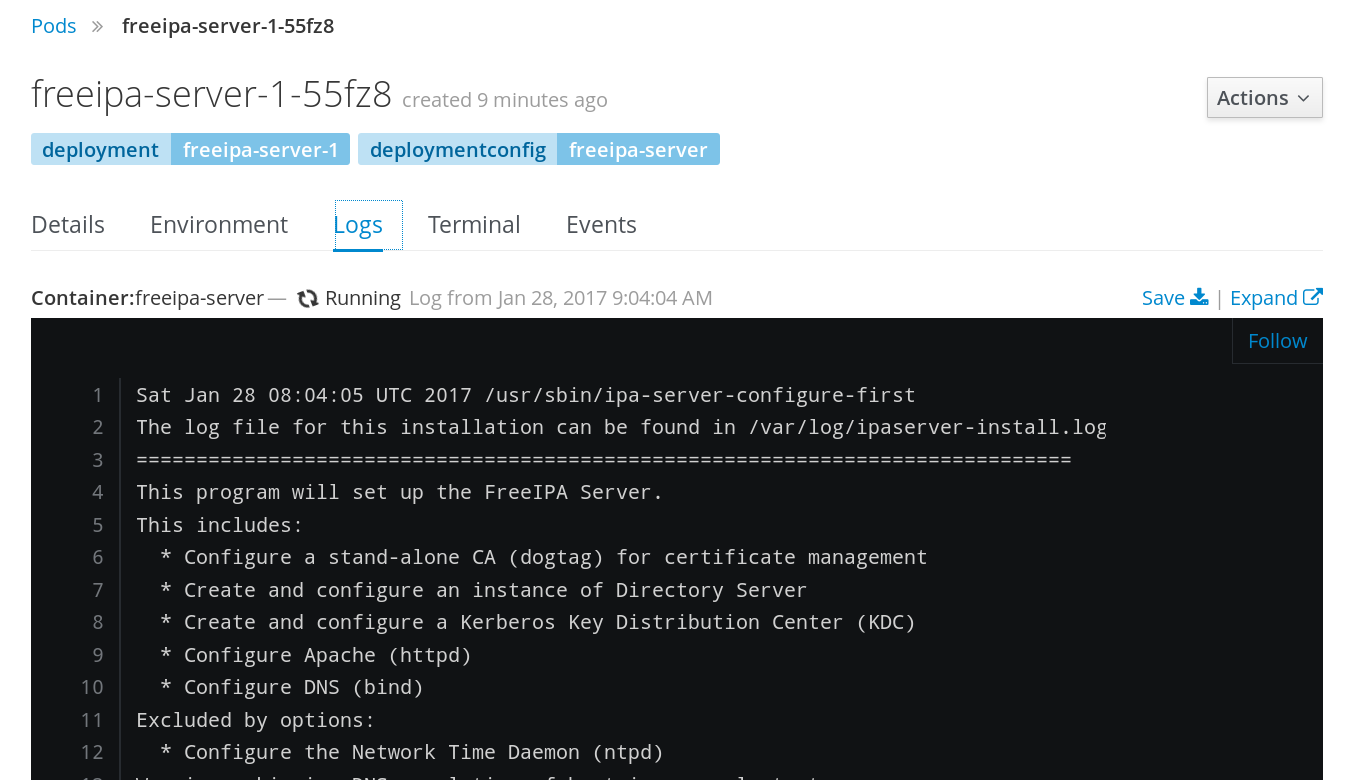Problem space
- Have favourite application setup / solution
- Currently maybe on physical host or some VM
- Multiple services / daemons
- Additional logic in the setup
- What if we want the solution
- To be more lightweight
- Easily deployable elsewhere
- Potentially offered as a service, with instances started on demand
Application and its setup
- Multiple services / daemons
- E.g. CMS, wiki, time-tracking system, ...
- Maybe with some database server
- Some cron jobs for sync and backup and monitoring
- And email setup for sending warnings out
- With sshd
- Used to yum upgrade the software or tweak the configuration
- Perhaps with some configuration management setup / agent
The goal
- Containerize the application setup
- Without necessarily breaking it into multiple containers
- Yes, it is an antipattern
- But one matching real needs
- Organizations do not want to unnecessarily spend resources to break their setups to multiple containers, only to stitch them back together
- Make it easy to deploy in some PaaS
- For example OpenShift
Containerizing complex application
- Install software in build time
- Set whatever can be pre-set in build time
- Identify and isolate configuration and data
- This can be iterative process
- Configuration and data need to end up in persisted volumes
- In run time, do initial “firstboot” configuration
- Based on small set of configuration parameters
- Remember, there will be multiple services to set up
- In run time, start and run the services, in proper order
Multiple services in container: execution
- Just like outside of container: init/systemd and targets and services
host$docker run -ti -e container=docker fedora:24 /usr/sbin/initsystemd 229 running in system mode. (+PAM +AUDIT +SELINUX +IMA -APPARMOR +SMACK +SYSVINIT +UTMP +LIBCRYPTSETUP +GCRYPT +GNUTLS +ACL +XZ +LZ4 +SECCOMP +BLKID +ELFUTILS +KMOD +IDN) Detected virtualization docker. Detected architecture x86-64. Welcome to Fedora 24 (Twenty Four)! Set hostname to <06cd3aff5b2e>. [ OK ] Reached target Local File Systems. [...] [ OK ] Started Update UTMP about System Runlevel Changes. - The
container=dockerenvironment variable needed for status output- Except for
fedora:25+ where it does not work (https://bugzilla.redhat.com/show_bug.cgi?id=1373780)
- Except for
- The infamous
-v /sys/fs/cgroup:/sys/fs/cgroup:roand--tmpfsfor/runand/tmpare no longer needed whenoci-systemd-hookis installed on the host and executed command looks like init
Execution with systemd in container
- The “firstboot” set can be run before exec-ing systemd
- Or it can be a systemd service, especially when
the initialization expects systemd to be running
app-configure.service:[Unit] Before=app1.service app2.service
andCOPY app-configure.service /usr/lib/systemd/system/ RUN systemctl enable app-configure
- Minimize the targets
RUN systemctl mask dnf-makecache.timer
- Or to workaround https://bugzilla.redhat.com/show_bug.cgi?id=1309574:
RUN systemctl mask systemd-sysusers.service
Things to consider
- Passing parameters to services
- For example via files in
/run
- For example via files in
- Output from services to container output
- For debugging and progress tracking
/proc/1/fd/1no longer works (https://bugzilla.redhat.com/show_bug.cgi?id=1413099)
Systemd-based setup in container
Dockerfile:FROM fedora RUN yum install -y httpd mod_ssl ... && yum clean all ENV container docker RUN systemctl enable httpd ... # Tweak configuration to turn distribution defaults # to your application's defaults EXPOSE 80 443 ENTRYPOINT [ "/usr/sbin/init" ]
- Build and run the container
- The services use and populate various files, those are the application setup's config and data
Identify configuration and data
- Software installed
/usr, default content of/varand/etc
- Services enabled
/etc/systemd/system/multi-user.target.wants
- Configuration of individual services
/etc
- Data of individual services
/var,/etc, ... and sometimes other locations
- Querying rpm database only helps so much;
docker diffhelps a lot
docker diff systemd-httpd
D /var/lib/rpm/__db.002 [...] C /var/lib/systemd/catalog/database [...] A /var/log/journal/7fb94583cd37a375e6c10909033c247b A /var/log/journal/7fb94583cd37a375e6c10909033c247b/system.journal [...] A /var/log/httpd/error_log A /var/log/httpd/ssl_access_log [...] C /var/cache/ldconfig/aux-cache [...] A /var/tmp/systemd-private-50192283a3134194bd3381d9416080f4-httpd.service-s4TWT0 [...] C /etc/group C /etc/machine-id C /etc/passwd C /etc/mtab [...] C /etc/ld.so.cache A /etc/.updated
Storage of complex setup
- Instance's state is what needs to be persisted
- All over the
/varand/etc(but not the whole/varand/etc)
- All over the
- We need single volume for the application setup
- Avoid mixups when only parts of the config or data would get mounted
- Upgrades when new locations need to be included
- Suggested approach: symlinked layout
- In build time
/data-templatewith the initial content- symlinks from the image to
/data
- In run time populate / update
/datafrom/data-template
- In build time
Build time preparation
volume-data-list:/etc/httpd/conf /etc/httpd/conf.d /etc/httpd/conf.modules.d /etc/systemd/system /var/log/httpd [...]
COPY volume-data-list /etc/
- Moving initial config and data aside:
RUN mkdir /data-template /data RUN while read i ; do \ mkdir -p /data-template$( dirname $i ) ; \ mv $i /data-template$i ; \ ln -sv /data$i $i ; done < /etc/volume-data-list VOLUME [ "/data" ]
Runtime initialization
init:#!/bin/bash ( cd /data-template && cp -npr --parents -t /data * ) exec /usr/sbin/init
COPY init /usr/local/sbin/init RUN chmod +x /usr/local/sbin/init ENTRYPOINT [ "/usr/local/sbin/init" ]
Storage preparation: initial
[...] /etc/hosts.allow /etc/hosts.deny /etc/httpd/conf /etc/httpd/conf.d /etc/httpd/conf.modules.d /etc/httpd/logs -> ../../var/log/httpd /etc/httpd/modules -> ../../usr/lib64/httpd/modules /etc/httpd/run -> /run/httpd /etc/init.d -> rc.d/init.d /etc/inittab [...] /etc/system-release -> fedora-release /etc/systemd/resolved.conf /etc/systemd/system /etc/systemd/system.conf [...] /var/log/hawkey.log /var/log/httpd /var/log/journal
Storage preparation: move to template
[...] /data-template:
/etc/hosts.allow
/etc/hosts.deny
/etc/httpd/conf
/etc/httpd/conf.d
/etc/httpd/conf.modules.d
/etc/httpd/logs -> ...
/etc/httpd/modules -> ...
/etc/httpd/run -> /run/httpd
/etc/init.d -> rc.d/init.d
/etc/inittab
[...]
/etc/system-release -> fedora-release
/etc/systemd/resolved.conf
/etc/systemd/system
/etc/systemd/system.conf
[...]
/var/log/hawkey.log
/var/log/httpd
/var/log/journal
Storage preparation: point to volume
[...] /data-template has content /etc/hosts.allow /etc/hosts.deny /etc/httpd/conf -> /data/etc/httpd/conf /etc/httpd/conf.d -> /data/etc/httpd/conf.d /etc/httpd/conf.modules.d -> /data/etc/httpd/conf.modules.d /etc/httpd/logs -> ... /etc/httpd/modules -> ... /etc/httpd/run -> /run/httpd /etc/init.d -> rc.d/init.d /etc/inittab [...] /etc/system-release -> fedora-release /etc/systemd/resolved.conf /etc/systemd/system -> /data/etc/systemd/system /etc/systemd/system.conf [...] /var/log/hawkey.log /var/log/httpd -> /data/var/log/httpd /var/log/journal
What is special about services
- Single setup interaction, during initialization
- Careful consideration needed about supported parameters and deployment options
- Status needs to live in volume(s)
- Typical container is easy to tweak (
docker execpost setup)- Plain container can be the bearer of application's identity
- In PaaS, containers get removed and recreated
- Typical container is easy to tweak (
- Hardened environments
- It might not be allowed to run systemd as root in PaaS
- UID-namespaces could help
- But see bugs https://bugzilla.redhat.com/show_bug.cgi?id=1401537, https://bugzilla.redhat.com/show_bug.cgi?id=1401944, https://bugzilla.redhat.com/show_bug.cgi?id=1402264; and https://bugzilla.redhat.com/show_bug.cgi?id=1406684
- Hostname handling might be limited
- It helps if the application can work with identity
!= $( uname -n )
- It helps if the application can work with identity
- Exposure of non-HTTP(S) traffic
- The PaaS environment might primarily target Web applications
- Application-level replication
- The PaaS environment might scale containers ... but what if they are stateful?
A complex application: FreeIPA server
- 389 Directory Server, KDC, CA, HTTP server, DNS server, OTP server, ...
- Many services on many ports
- It can serve as ultimate source of identities, including host identities
- It can run its own DNS server instance
- Built-in replication
- Start with one master, set up replicas from it
- https://github.com/freeipa/freeipa-container
- Containerized (single-container) setup available upstream for a while
- Available as technology preview with RHEL Atomic 7.3.1
FreeIPA server as a service
 |
 |
 |
FreeIPA in OpenShift
- https://github.com/freeipa/freeipa-container/blob/master/freeipa-server-openshift.json
-
UID-namespacing not yet in OpenShift, coming in 1.6 later this year.
#oc login -u system:admin[...] Using project "devconf-2017".#oc create serviceaccount userootserviceaccount "useroot" created#oc adm policy add-scc-to-user anyuid -z useroot - Create
PersistentVolume—hostPathPV example in https://github.com/freeipa/freeipa-container/blob/master/freeipa-server-openshift-volume.json - New application — via WebUI if the JSON template was imported, or
#oc new-app --name freeipa-x -f ./freeipa-server-openshift.json \ -p IPA_SERVER_SERVICE=freeipa-1 -p IPA_ADMIN_PASSWORD=Secret123 \ -p IPA_SERVER_HOSTNAME=freeipa.example.test \ -p IPA_SERVER_IP=172.30.248.14 \ -p IPA_SERVER_IMAGE=freeipa-server:centos-7
Notes about FreeIPA in OpenShift
- Single volume
"volumes": [ { "name": "${IPA_SERVER_SERVICE}-data", "persistentVolumeClaim": { "claimName": "${IPA_SERVER_SERVICE}" } },"volumeMounts": [ { "name": "${IPA_SERVER_SERVICE}-data", "mountPath": "/data" }, - Not available in Online yet due to the need of
anyuidfor systemd clusterIPforService, to expose the non-Web traffic- Master only for now — neither
PetSetnorStatefulSetseem to start the second pod
Complex applications as service
- Ultimately, the container should run with read-only filesystem
- Some software is not happy with symlinks
- SELinux separation is lost — the same type for all processes in the container
- Use of environment variable as initial setup parameters
- Native hostname is not what the application wants to use
Conclusion
- Server side works
- Need to flesh out replication
- Can be used as an example for other complex setups that are not practical to be broken into smaller containers
- Client side — SSSD containers exist ...
- Consuming them in other services might be tricky
References
- https://github.com/freeipa/freeipa-container
*.jsonfiles
- https://hub.docker.com/r/freeipa/freeipa-server/
- https://www.adelton.com/docs/containers/complex-application-in-container

